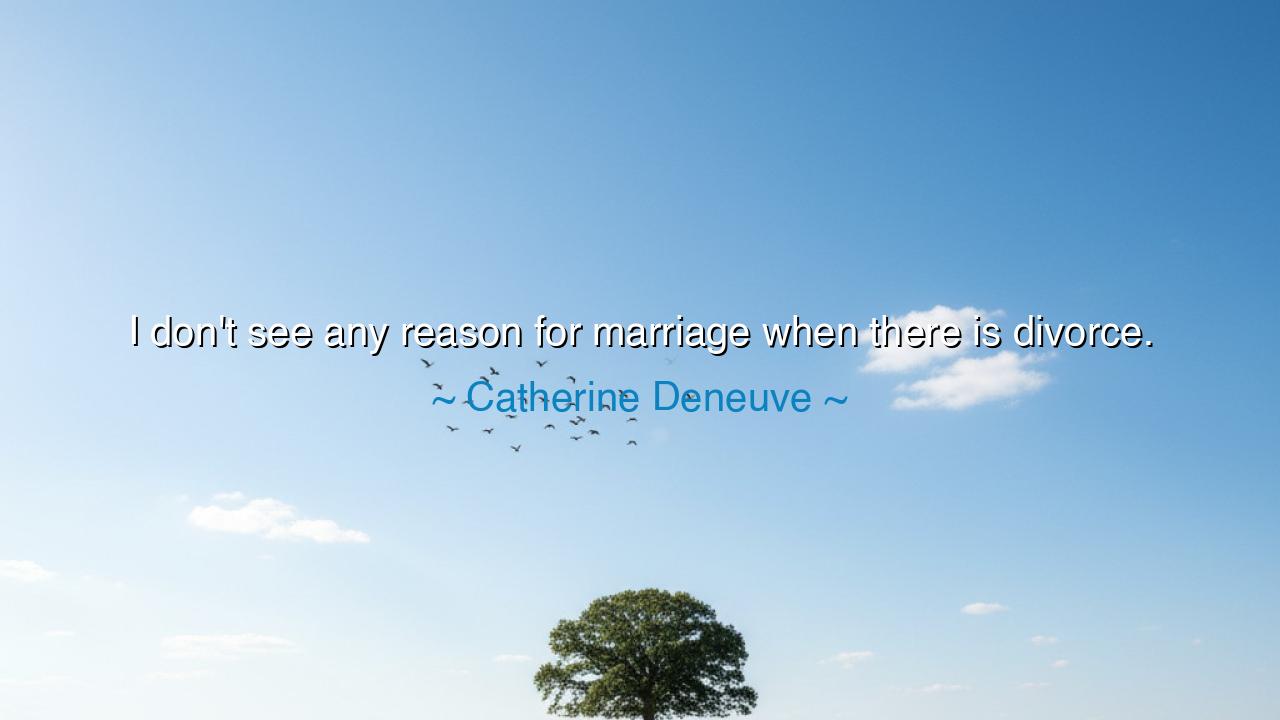
I don't see any reason for marriage when there is divorce.






The words of Catherine Deneuve — “I don’t see any reason for marriage when there is divorce.” — sound at first like a rebellion, a challenge flung at one of civilization’s oldest institutions. Yet beneath their sharp edge lies not cynicism, but wisdom born of observation. They are the words of a woman who has witnessed the promises and disillusions of love, who has seen the grandeur of passion fade under the weight of convention. In her voice echoes the eternal question: if love is true, why must it be bound; and if love is false, why should a bond remain?
Catherine Deneuve, the luminous French actress whose life and art embodied elegance and independence, spoke these words in an age when the institution of marriage was being questioned anew. Having lived through the revolutions of the twentieth century — social, sexual, and emotional — she saw how the freedom to divorce changed the very nature of love. Where once marriage was a chain that could not be broken, now it was a choice, fragile and reversible. Her words reflect the paradox of modern love: that when the exit is open, the entrance itself loses some of its gravity. Marriage, she suggests, is only meaningful when it carries the weight of permanence; once that weight is lifted, the promise itself seems less sacred.
In the ancient world, such a thought would have stirred both awe and outrage. The ancients revered marriage as a covenant of order, a bond that bound families, kingdoms, and destinies. Yet even in those times, wise voices questioned whether human hearts could truly be owned. The philosopher Epicurus, though not against love, warned that attachment often brings more sorrow than peace. And centuries later, poets like Ovid and Sappho spoke of love as something divine precisely because it could not be contained by law or ritual. Thus, Deneuve’s reflection stands in a lineage of those who dared to ask whether binding love diminishes it — whether the purity of affection is lost when it is forced to conform.
Consider the tale of Eleanor of Aquitaine, queen of both France and England — a woman of fierce mind and untamable spirit. Married first to Louis VII, she found the union cold and constrained, a prison gilded by politics. Their marriage ended in annulment, and she later wed Henry II of England. Yet even as queen, she suffered betrayal and confinement, imprisoned by her husband for her defiance. Her story is a mirror of Deneuve’s sentiment: that the institutions meant to sanctify love often become its cage. For Eleanor, as for many, freedom became the truer measure of affection. When law governs love, passion withers; when love is free, it breathes.
But Deneuve’s words do not mock marriage itself — they mourn what it has become. For marriage, in its truest form, was once a sacred vow of unity, not a social performance. She reminds us that when divorce becomes an escape from carelessness, rather than a last resort against cruelty, the sacredness of the bond dissolves. If one enters a covenant already half-expecting its end, then the beginning is weakened. Her reflection is not a rejection of love — it is a plea for authentic commitment, one not born of law but of conscious choice. She would rather see love free and genuine than bound and false.
Yet, there is another layer of truth in her words: that the existence of divorce has liberated countless souls from lives of quiet despair. It has given the abused, the neglected, and the loveless a path toward renewal. But Deneuve asks us to confront the cost of that liberation — whether the sanctity of partnership has been diluted by the ease of escape. For when every door is left ajar, commitment becomes a whisper rather than a vow. Her question is not against freedom, but against the carelessness that often accompanies it. Freedom without responsibility, she warns, becomes emptiness.
So let the lesson be this: do not marry out of habit, nor fear, nor expectation. Let love itself be the only reason to bind your life to another, and let that bond be founded not upon law but upon loyalty. If you must part, do so with grace — but never enter the union half-heartedly, thinking of its undoing before its beginning. Marriage, when entered in truth, can still be sacred — but its holiness must come from the souls who sustain it, not from the signatures that frame it.
And remember this, my child: what Catherine Deneuve speaks of is not the death of marriage, but the rebirth of love’s honesty. When law and ritual no longer hold us captive, we are left with only our hearts — and it is then, in that naked sincerity, that we must ask ourselves: Do I love enough to stay, not because I must, but because I choose to? Only when love answers yes, freely and fully, does it need no institution to make it eternal.






AAdministratorAdministrator
Welcome, honored guests. Please leave a comment, we will respond soon